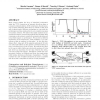Free Online Productivity Tools
i2Speak
i2Symbol
i2OCR
iTex2Img
iWeb2Print
iWeb2Shot
i2Type
iPdf2Split
iPdf2Merge
i2Bopomofo
i2Arabic
i2Style
i2Image
i2PDF
iLatex2Rtf
Sci2ools
112
click to vote
CCR
2011
2011
Two-way TCP connections: old problem, new insight
Many papers explain the drop of download performance when two TCP connections in opposite directions share a common bottleneck link by ACK compression, the phenomenon in which download ACKs arrive in bursts so that TCP self clocking breaks. Efficient mechanisms to cope with the performance problem exist and we do not consider proposing yet another solution. We rather thoroughly analyze the interactions between connections and show that actually ACK compression only arises in a perfectly symmetrical setup and it has little impact on performance. We provide a different explanation of the interactions—data pendulum, a core phenomenon that we analyze in this paper. In the data pendulum effect, data and ACK segments alternately fill only one of the link buffers (on the upload or download side) at a time, but almost never both of them. We analyze the effect in the case in which buffers are structured as arrays of bytes and derive an expression for the ratio between the download and ...
| Added | 13 May 2011 |
| Updated | 13 May 2011 |
| Type | Journal |
| Year | 2011 |
| Where | CCR |
| Authors | Martin Heusse, Sears A. Merritt, Timothy X. Brown, Andrzej Duda |
Comments (0)

